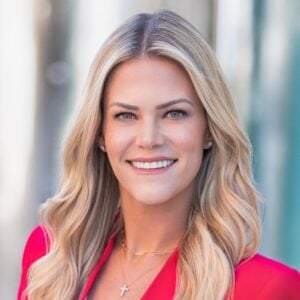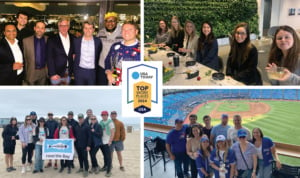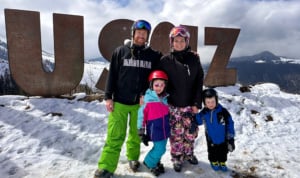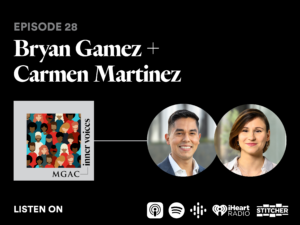MGAC Impacts: Alicia Fleming on the Power of Mentorship, Growth in Toronto, and Taking Time for Mindfulness
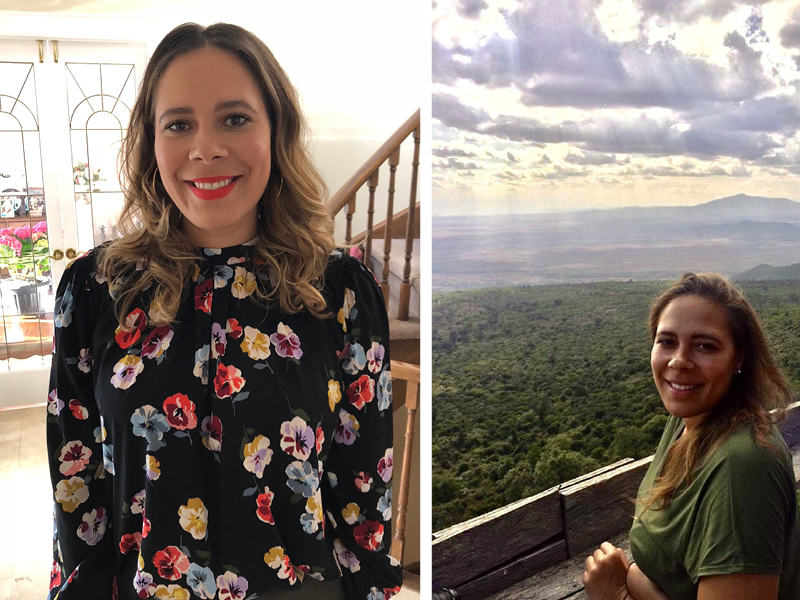
The Impact Blog is a spotlight series that highlights and celebrates the diverse employees that make MGAC tick. Beyond their day-to-day schedules, we want to know how they have a greater impact on their colleagues, their company, and the communities in which they live and work. We want to know what makes them get out of bed in the morning, what led them to their current role, and what they hope their lasting impact will be.
—
MGAC: Hi Alicia! It’s great to have you on the Impact Blog. Tell us what you do at MGAC.
Alicia Fleming (AF): I’m a Senior Project Manager located in MGAC’s Toronto office. Currently, I’m working on a number of projects, largely in the commercial sector.
MGAC: Tell us about that—what’s keeping you busy these days?
AF: I’ve been involved with our client T-Mobile for going on two years now. I can’t believe it’s already been that long! Initially, I was brought onto MGAC’s project management team to help support the Bellevue headquarters renovation. That work has led to continued support and collaboration with T-Mobile, and I am part of MGAC’s project management team that continues to partner with them on the additional real estate portfolio needs they have.
MGAC: Nice. And how are things in the Toronto office?
AF: Our Toronto office is really in a stage of growth. It’s been exciting to work with our office leadership to optimize our market strategy and help solidify our action plans for the year.
MGAC: That includes an office move, right?
AF: That is correct! Our current office is about 45 minutes outside of downtown Toronto. We’re moving into a vibrant up-and-coming neighborhood in the city. It’s going to really transform in the next couple of years. We’re going to have some great neighbors and are just excited to be a part of it all. And after the year we’ve all had with the pandemic, it just feels like a great fresh start.
MGAC: Yes, absolutely! How long have you been on board?
AF: I’ve been at MGAC for just over three years now.
MGAC: What were you doing before you came to MGAC?
AF: I was in the Toronto area working at a large engineering consulting firm when I was first introduced to MGAC. At the time, I remember being really drawn to MGAC’s philosophy of more of a client-focused approach to its projects, as well as its commitments to its clients’ missions. I started my career out at a smaller firm, where I felt very connected to the projects I was working on. And, while I did learn a lot about business working at a large engineering firm, I wanted to get back to the fundamental work we get to do as project managers for our clients. I love talking to clients about projects, what makes them tick, and what’s important to them. For all those reasons, I knew MGAC would be a good fit for me.
MGAC: It sounds like you were spot on. Were you always on track to work in project management?
AF: Not exactly. When I was younger, and it came time to start thinking about what I was going to do career-wise, I was so sure I wanted to be an architect. I had no back-up plan; I didn’t apply to any other programs of study! It’s funny looking back, because architecture programs, at least here in Canada, are notoriously competitive and difficult to get into. So, not having a back-up plan was probably not the smartest thing—but it all ended up working out in the long run!
MGAC: Interesting! So how did that ultimately lead you to the path you’re on today?
AF: Studying architecture was my first introduction to this industry. I was lucky that the program was very multidisciplinary. It gave me exposure to everything from building envelope design to construction project management. And that gave me a window into all the different facets of a project, which was so much more than architectural design. I found myself wanting to be a part of that bigger picture. So that’s how I ended up in project management.
MGAC: That’s a great introduction to the project management world. When you think about your work with MGAC today, what impact do you hope to have?
AF: We are so lucky that we get to work on things that materialize into something physical. Ultimately, I hope the work I do solves problems for people. It might be creating a space that contributes to an occupant’s health, mood, and productivity. Or maybe it’s job creation. Maybe it’s creating a new experience. What we do in this industry has a profound impact on people. That’s a really rewarding aspect of the job.
MGAC: It seems like you’re always thinking about how your work will impact your community at large.
AF: Absolutely. The projects we work on will ultimately become a part of a city’s fabric. And I hope the structures we create represent the cities in which they stand. I hope they reflect the values, the culture, and the success of the people who live and work there.
MGAC: What have you learned at MGAC?
AF: Two things come to mind. First, integrity is everything. It’s so important to do what you say you’re going to do, and to be trustworthy, honest, and reliable. That is in MGAC’s core fundamentals. We must hold ourselves to a higher standard to set the best example for the people around us.
MGAC: That’s such an important value to live up to. What’s the second?
AF: The other thing MGAC has taught me is that a company’s most valuable asset is its people. They determine the client’s experience. If it’s a good experience, we win. It’s really that simple.
MGAC: What at MGAC has made an impact on you?
AF: All the wonderful people who make MGAC what it is. We have such a diverse group of people who work with us. They come from diverse professional backgrounds, and they all bring their own perspective to what we do every day. It’s really refreshing.
MGAC: And that must influence the work you’re able to do for clients.
AF: Having the opportunity to evaluate something from a range of perspectives really enhances the work we do. Plus, everyone is so open and transparent with each other, and always willing to lend a helping hand. Sometimes you may be the only one from MGAC on a particular project. Knowing you have that support back in the office really makes all the difference.
MGAC: What have you found most rewarding about your job?
AF: For me, there’s a lot of things that go into feeling job satisfaction. It can be something as little as making a client happy with small wins. It can also be seeing all the hard work you put in as a project manager, together with your collective team, materialize into something. It’s just amazing to see what we can accomplish when we work as a team for the common goal. It’s powerful—and really gratifying.
MGAC: Making all that happen takes so much coordination and effort. What gives you energy to tackle it all?
AF: In my personal life, it’s friends, family, and places. Professionally, I’d say my team and my colleagues, and also new challenges. Problem-solving requires a level of creativity, intuition, and skills. But, it also requires patience. Those are things that really invigorate me and give me a sense of purpose in what I do.
MGAC: What is your secret to winding down at the end of a long day?
AF: These days, a nice walk around the neighborhood really helps me decompress. Fresh air and movement really work for me. Maybe listening to a good podcast, too. That all helps me shake off the day.
MGAC: What are your podcast go-to’s?
AF: I mix it up! Sometimes, they’re about personal and business development—I’m a fan of “The Modern Mentor” and “Coaching Real Leaders.” Other times, I’ll put on podcasts that cover popular culture, social media, and news events in a fun way.
MGAC: What’s a book that has made a significant impact on your life?
AF: I think one of the books that comes to mind is The Year of Yes. It’s a bit of a memoir, and it’s about a year-long experiment where the author endeavors to say “yes” to everything in her life, personally and professionally, no matter what.
MGAC: What a cool concept!
AF: It really is. The purpose is to highlight that in life, it’s really easy to just say “no” to something. To say “no” to a new opportunity, “no” to a challenge, “no” to meeting new people. Ultimately, it’s about overcoming fear and self-doubt—and also about being kind to yourself and recognizing your own power. Because we often are our own harshest critics.
MGAC: How about a favorite quote that inspires you?
AF: One that has really resonated with me recently is “You must do the thing you think you cannot do.” It’s really about strength, courage, and confidence, and ultimately personal growth.
MGAC: We’ve talked about winding down at the end of a long day…what about your secret to starting the morning off on the right foot?
AF: My morning routine has certainly evolved over the last year. Prior to this pandemic, we all had a different routine that involved getting ourselves out the door and starting our commute. But these days, I’m typically using my morning to do some self-care. I’ve been reading about the benefits of meditation: taking a few minutes to focus inward and really start your day off with some mindfulness. I focus on my water intake. I’ll read the news and slowly sip on my beloved coffee. I also try to get in a high-intensity workout several times a week. I think all these little rituals help me. They give me a sense of calmness and are fuel for my day.
MGAC: It sounds like you’re establishing routines that will be useful even once COVID is in the rear-view.
AF: I think that’s what this year has been all about. It has given people space and time to look inward and think about what is and isn’t working for them. I have read so much about stress levels going way down as people look at things in a different way. That’s not to say this past year hasn’t taken a toll on people’s mental health, but I think overall stress levels from our daily grind have gone down a bit—and that’s a positive thing. There are habits we’ve been able to form over the last year that we should certainly take with us.
MGAC: What do you want your lasting impact to be?
AF: I am a very strong believer in mentorship. I was lucky early on in my career to have two really good female mentors, and that did wonders for me professionally. That’s one of my goals going forward. Even if I don’t have a dedicated mentee, if I’m working with someone who is more junior than me or I see there is an opportunity to offer them something, I try to bring that to the table. I believe there is such a power in mentorship and bringing someone along with you as you evolve in your career, so I try to practice and have that mentality on all the projects I work on.
MGAC: How incredible. The idea of female-driven mentorship feels especially meaningful in this industry.
AF: It’s so true. MGAC does a fabulous job of not just hiring women, but promoting women. And that’s really great. But, the reality is when we go out in the industry—on our job sites, in client’s offices— that diverse landscape is not always the same. There have been many times in my career where I have been the only female at a boardroom table during a meeting. It’s not uncommon. For me, having that mentorship early in my career gave me the confidence I needed to lead people. And that’s the job! So, I can’t say enough about mentorship and the lasting impact it can have on people.
MGAC: Now, we have a few rapid-fire questions for you to answer. Are you ready?
AF: Absolutely!
MGAC: Describe your job in 5 words or less.
AF: Making a difference.
MGAC: What’s the first thing you do at work every day?
AF: If I’m at the office, it would definitely be to say hello to my colleagues and catch-up, make coffee. Now that I’m at home, it’s definitely still making coffee! And getting mentally prepared for the day ahead.
MGAC: What’s the last thing?
AF: I do a brain-dump of everything going on. I jot down notes of things I’m thinking about and make my to-do list for the next day.
MGAC: Making your to-do list at the end of the day prior is a new one! What’s the weirdest thing we might find in your desk or work bag?
AF: Earplugs, maybe?
MGAC: Interesting! For job sites?
AF: They’re multi-purpose! I do wear them on job sites. I also used to travel a lot, and they’re great on an airplane and in airports. And they’re also handy if I’m in the city or on the subway and need a little bit of quiet.
MGAC: Very multi-purpose! What can’t you leave home without?
AF: I’m going to really shock you with this one: my cell phone.
MGAC: What’s your go-to weekday lunch?
AF: I’m a leftovers kind of gal. It just makes my life easy. (That’s applicable to at-home and in the office.)
MGAC: What’s the most used app on your phone?
AF: Probably Messenger or WhatsApp. A lot of my friends are in the U.S. now, but over the years, I’ve had friends in Kenya—all over the place! WhatsApp helps keep us connected.
MGAC: What’s something your colleagues don’t know about you?
AF: Maybe that I’m a pretty athletic person. Growing up as a kid, there wasn’t a sport that I didn’t play. I was on all the teams during my school years. I even did alpine skiing and raced professionally.
MGAC: Where do you see yourself in 5 years?
AF: I can honestly say that I hope that I am still doing rewarding work; I’m still part of projects that are making a difference for people and their businesses. I hope that I am still working at this great organization, MGAC. It really has had a profound impact on me. And I hope to continue to progress within the company. Whether it’s Vice President or some other role, continuing to grow and evolve professionally is really a priority for me.
MGAC: What’s your biggest work goal for 2021?
AF: To take a lot of the things we’ve learned over the course of this year and apply them practically. I’m not sure yet exactly what that’s going to look like, but taking everything we know and have learned—about ourselves, the world around us, and our clients—and translating it into practice. Here at MGAC, I think we can be a conduit for people. We all know that we’re not going to go back to what things were. Helping our clients come to the realization of what this transition period looks like, and what changes lie ahead, is key. This year is going to be what you make of it.
